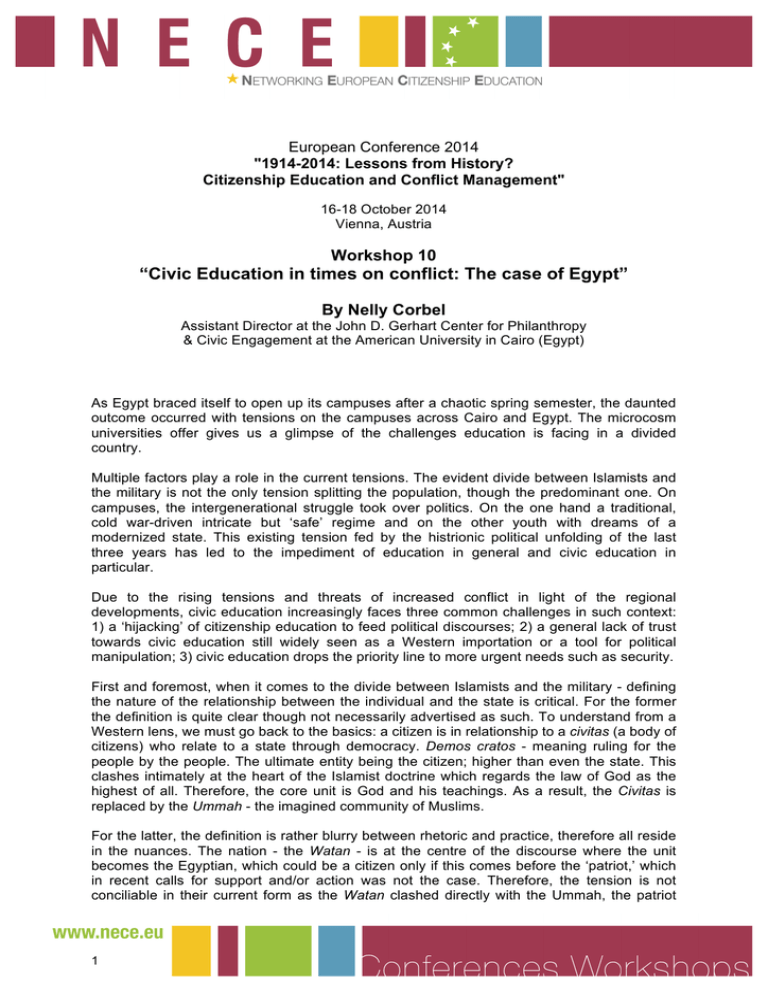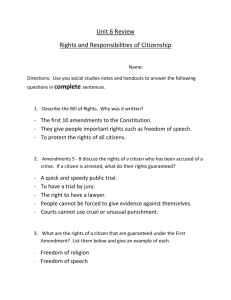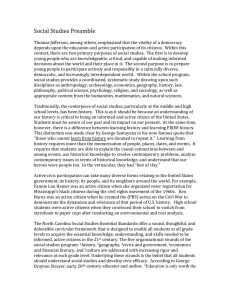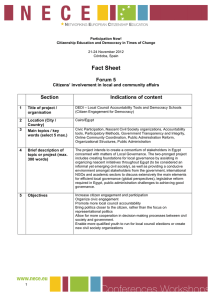Document 13157261
advertisement

European Conference 2014 "1914-2014: Lessons from History? Citizenship Education and Conflict Management" 16-18 October 2014 Vienna, Austria Workshop 10 “Civic Education in times on conflict: The case of Egypt” By Nelly Corbel Assistant Director at the John D. Gerhart Center for Philanthropy & Civic Engagement at the American University in Cairo (Egypt) As Egypt braced itself to open up its campuses after a chaotic spring semester, the daunted outcome occurred with tensions on the campuses across Cairo and Egypt. The microcosm universities offer gives us a glimpse of the challenges education is facing in a divided country. Multiple factors play a role in the current tensions. The evident divide between Islamists and the military is not the only tension splitting the population, though the predominant one. On campuses, the intergenerational struggle took over politics. On the one hand a traditional, cold war-driven intricate but ‘safe’ regime and on the other youth with dreams of a modernized state. This existing tension fed by the histrionic political unfolding of the last three years has led to the impediment of education in general and civic education in particular. Due to the rising tensions and threats of increased conflict in light of the regional developments, civic education increasingly faces three common challenges in such context: 1) a ‘hijacking’ of citizenship education to feed political discourses; 2) a general lack of trust towards civic education still widely seen as a Western importation or a tool for political manipulation; 3) civic education drops the priority line to more urgent needs such as security. First and foremost, when it comes to the divide between Islamists and the military - defining the nature of the relationship between the individual and the state is critical. For the former the definition is quite clear though not necessarily advertised as such. To understand from a Western lens, we must go back to the basics: a citizen is in relationship to a civitas (a body of citizens) who relate to a state through democracy. Demos cratos - meaning ruling for the people by the people. The ultimate entity being the citizen; higher than even the state. This clashes intimately at the heart of the Islamist doctrine which regards the law of God as the highest of all. Therefore, the core unit is God and his teachings. As a result, the Civitas is replaced by the Ummah - the imagined community of Muslims. For the latter, the definition is rather blurry between rhetoric and practice, therefore all reside in the nuances. The nation - the Watan - is at the centre of the discourse where the unit becomes the Egyptian, which could be a citizen only if this comes before the ‘patriot,’ which in recent calls for support and/or action was not the case. Therefore, the tension is not conciliable in their current form as the Watan clashed directly with the Ummah, the patriot 1 with the believer. In many ways, only the ‘citizen’ can bring both perspectives together which brings us to the second issue. Now, both identities are not mutually exclusive per say, however, which one is the priority when trickling it down to practicalities of a governance system, the realities of this tension catches up. As both predominant sides of the divide promote a fundamentally undemocratic relationship to the state, supporters of either camp will easily breakdown the rhetoric of the other while prevaricating on its own contradictions, leaving the democrats perplexed and incapable of rallying around their cause. This constant hijacking of the democratic discourse feeds into the distrust towards citizenship, democracy and all similar keywords, which ultimately paves the way for the solidification of a dictatorship. Last but not least, the current regional and national security challenges between a porous border with Libya, a complicated relationship with Nile countries and an armed conflict in North Sinai with Islamist groups preaching allegiance to the Caliphate - Egypt is at the epicentre once more where war and peace in the Middle East is decided. Consequently, not only civic education becomes a lesser priority but also witnesses a tightening of the laws governing its practice in the informal space. With a number of western government working directly with local civil society not always coordinating with government, they unfortunately feed into this discourse. Though, it requires extra diplomatic steps, it is critical for these governments to establish a relation with the Egyptian government before operating or donating funds locally. In addition to alienating the local government, this omission on their part creates a climate of insecurity for their local partners. Inter-governmental coordination is common practice in international cooperation, regardless of disagreements and would allow for a more sustainable impact. The other tension mentioned above affecting education is the inter-generational gap. The last few decades have seen more changes affecting social interaction than any other period in history in such a short period. While educators have learned before the age of the internet, during the cold war and at the peak of bureaucracy development, their students are learning as much from their social interactions, than in the classroom, discovering what lies beyond borders, local religions and cultural traditions. This gap is constantly challenging the education system, challenging the relationship between learners and teachers. It is therefore critical to build a dialogue between both constituents to improve the learning process. During the workshop, the discussion addressed the similarities and differences on the topic between Russia and Egypt and how can the civitas gain back its ethos, beyond nationalistic, political, religious or cultural factors. 2






